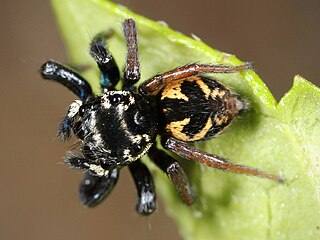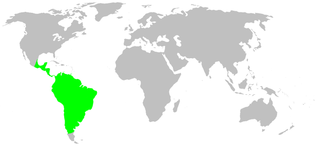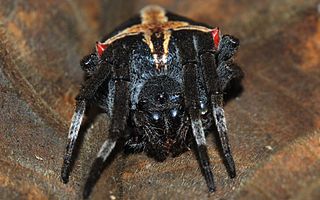
Crevice weaver spiders (Filistatidae) comprise cribellate spiders with features that have been regarded as "primitive" for araneomorph spiders. They are weavers of funnel or tube webs. The family contains 18 genera and more than 120 described species worldwide.

Corinnidae is a family of araneomorph spiders, sometimes called corinnid sac spiders. The family, like other "clubionoid" families, has a confusing taxonomic history. Once it was a part of the large catch-all taxon Clubionidae, now very much smaller. The original members of the family are apparently similar only in that they have eight eyes arranged in two rows, conical anterior spinnerets that touch and are generally wandering predators that build silken retreats, or sacs, usually on plant terminals, between leaves, under bark or under rocks.

Corythalia is a genus of jumping spiders that was first described by Carl Ludwig Koch in 1850.

Metaphidippus is a genus of jumping spiders that was first described by Frederick Octavius Pickard-Cambridge in 1901. The name is combined from Ancient Greek μετά "after, beside" and the salticid genus Phidippus.

Trechaleidae is a family of araneomorph spiders first described by Eugène Simon in 1890, and includes about 140 described species in 16 genera. They all live in Central and South America except for Shinobius orientalis, which is endemic to Japan.
Ordgarius is a genus of orb-weaver spiders first described by Eugen von Keyserling in 1886.

Coneweb spiders (Diguetidae) are six-eyed haplogyne spiders that live in tangled space webs, fashioning a cone-like central retreat where they hide and lay eggs. It is a small family, containing only two genera with fifteen species and is confined to the New World, preferring deserts. Members of the genus Diguetia usually build their webs in shrubs or between cactus pads. They have the same eye arrangement as the venomous recluse spiders, but none are known to be harmful to humans.

Senoculus is a genus of araneomorph spiders in the family Senoculidae, and was first described by Władysław Taczanowski in 1872. It is the only genus in the family Senoculidae.

Ctenus is a genus of wandering spiders first described by Charles Athanase Walckenaer in 1805. It is widely distributed, from South America through Africa to East Asia.

Parawixia is a genus of orb-weaver spiders first described by F. O. Pickard-Cambridge in 1904. Most species are found in the Neotropics but one species, Parawixia dehaani, is found in Australasia and tropical Asia as far west as India.
Abapeba is a genus of Central and South American corinnid sac spiders first described by A. B. Bonaldo in 2000.
Septentrinna is a genus of corinnid sac spiders first described by A. B. Bonaldo in 2000.
Creugas is a genus of corinnid sac spiders first described by Tamerlan Thorell in 1878.

Trachelas is a genus of araneomorph spiders originally placed with the Trachelidae, and later moved to the Corinnidae.

Nilus is a genus of nursery web spiders that was first described by Octavius Pickard-Cambridge in 1876.
Allende is a genus of South American long-jawed orb-weavers that was first described by F. Álvarez-Padilla in 2007.
Metabus is a genus of long-jawed orb-weavers that was first described by Octavius Pickard-Cambridge in 1899.










